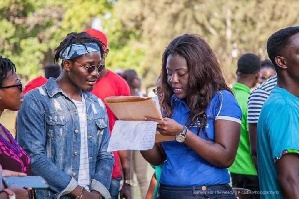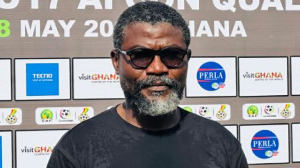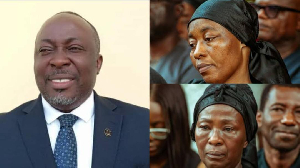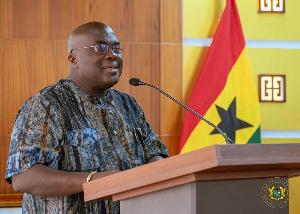She grew up with her mother, a single parent and it was not easy; it was tough. Sometimes, her mother went to bed on an empty stomach so she can get money to go to school the next day.
“I know what it is; I know how it feels not to get something that you really want. I was too young to know that my mother was going through difficulty but it opened my mind so fast that I was able to tell when she didn’t have.
“I was able to tell when things were so hard but she couldn’t tell me,” narrates28-year-old Ghanaian social entrepreneur and founder of Tatas and Friends Foundation, Caritas Naa Ayele Aryee, popularly known as ‘Tatas’.
In tears, she reveals: “I think naturally, I am someone who likes to give. Growing up, I used to follow my mum to work – she was a caterer at the Ministry of Foreign Affairs and on our way, I used to see lepers all over Kaneshie [one of the biggest markets in Accra], and I used to tell myself that one day I will build a big house for all of them including those selling water.”
Naturally, she has a soft spot for people who are in need and she is living up to her name which means ‘Charity’ – to give. That said; she believes her experience has also pushed her to help people who are less privileged.
Kenkey for the Needy:
In 2013, Caritas started a foundation called ‘Tatas and Friends’, aimed to transform lives of children in rural communities in the world’s second largest cocoa growing nation.
“We reach out to anyone in need and they are our target. It could be a home, an individual, a school, community; anyone. We just want to help — our help may not be too big but we do it in any way we can impact,” explains Caritas on the focus of her foundation.
One of the foundation’s initiative that has gained much attention on social media and making impact is ‘Kenkey for the Needy’ — Kenkey is popular Ghanaian staple food wrapped in a layer(s) of maize husk or plantain leaves and steamed after fermentation. There are several versions of kenkey, such as Ga and Fante kenkey. The food is popular in Greater Accra, Central and Western regions of Ghana.
The ‘Kenkey for the Needy’ party brings people together to buy and eat kenkey – the proceeds from the party is used to fund projects.
“We had the first edition in 2014 and our target was GHS10,000 — with the help of social media – Facebook, Instagram and Twitter, we were able to raise GHS15,000 to support a public school in the northern part of the country,” ecstatic Caritas says.
The second edition held recently at the Efua Sutherland Children’s Park in Accra was a huge success. The funds which were raised have been used to buy furniture for the Fiankoya Basic School in Dodowa and Cape Coast School for the deaf and blind.
“When I see hundreds of Ghanaians turning up for ‘Kenkey for the Needy’ it means there are people out there who want to help but they don’t know how to so it’s like my foundation is a channel so why not; let’s just do this and keep them coming,” she adds.
Per the attendance and buzz on social media, every year, Ghanaians look forward to ‘Kenkey for the Needy’, but Caritas says her organisation needs to improve upon it and make it bigger and better. “So far, It’s been amazing and it just tells you the power of social media because that is what we use to help raise our funds.”
Funding challenges:
Though she has been widely accepted by the Ghanaian public, her foundation has major challenges and funding is on top of the list. “We are trusting God that one day, we would have done a good job to attract private and public organisations to partner us.I believe that we will get to that part where funding wouldn’t be a problem,” confident Caritas says with a smile.
Another major problem she is battling with is negative perception people have about operators of non-profit organisations. “In Ghana, there is the widely held perception that people who operate Foundations and NGOs squander funds donated to their organizations and that worries me a lot,” Caritas said.
Currently, Caritas runs the Foundation with 50 young Ghanaians who pay dues as members. Other members make monthly donations to the foundation as their commitment.
The future is beautiful, thanks to social media:
When asked about the future of the foundation, she says: “If you look at the future, it is beautiful; there is a lot going to happen and we are preparing for that,” adding that even if it gets to the point where she has to quit her job with BIMA, a leading provider of mobile-delivered insurance and health services in emerging markets, she will.
“The future is bright and we are putting all the necessary measures in place. Yes, we may fall short sometimes but we will pick ourselves up and push forward.
“I’m working, schooling and running the foundation – it’s like I don’t sleep. I don’t sleep; my nights are deep because I am always on my laptop; thinking and planning -combining work and school is not easy but by the grace of God, I have the strength to do all that. I really want to impact lives of children on the African continent.”
She plans to establish a branch of Tatas Foundation in the United States, and touching on youth entrepreneurship and social media in Ghana, she explains: “I will clap for Ghana because the youth are now doing stuff for themselves. Even me, I am doing something for myself. We have taken it so serious and that is a good thing.
“Right now I am known and I think it’s a good thing. I am glad that I am known for a cause, and I will call myself a social media influencer.”
Caritas has over 1,800 followers on her on Facebook page; over 9,500 followers on Twitter and her Instagram page has 12,000 followers. “In a day, I get a lot of requests on my Facebook page but I am yet to confirm them. On Snap Chat, I have about 1,000 followers.”
Caritas, who also call herself ‘Mother Theresa of Africa’ is inspired by Oprah Winfrey, American media proprietor, talk show host, actress, producer, and philanthropist.
“She because for someone like her to be raped but when you read her whole journey; you wonder how she got there. It just means that it is possible for everybody to get there.”
Caritas concludes: “My advice to the youth is that they should find what they are good at and use social media to boost it. If you are thinking of building something, use it [social media], learn it. There is more to social media than just posting pictures and videos.”
General News of Saturday, 5 November 2016
Source: viasat1.com.gh













